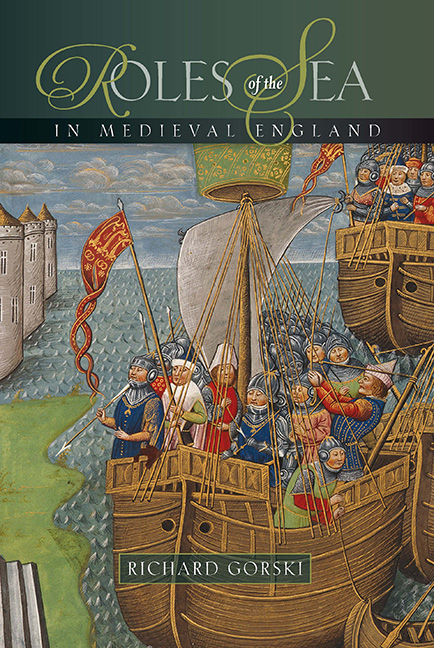Book contents
- Frontmatter
- Contents
- List of Contributors
- Map
- 1 Roles of the Sea: Views from the Shore
- 2 Changes in Ship Design and Construction: England in the European Mould
- 3 The Value of the Cinque Ports to the Crown 1200–1500
- 4 The Contribution of the Cinque Ports to the Wars of Edward II and Edward III: New Methodologies and Estimates
- 5 Keeping the Seas: England's Admirals, 1369–1389
- 6 The Cost-Benefit Analysis of a Fourteenth-Century Naval Campaign: Margate/Cadzand, 1387
- 7 Piracy and Anglo-Hanseatic Relations, 1385–1420
- 8 ‘Herring of Sligo and Salmon of Bann‘: Bristol's Maritime Trade with Ireland in the Fifteenth Century
- 9 How Much did the Sea Matter in Medieval England 167 (c.1200–c.1500)?
- Index
1 - Roles of the Sea: Views from the Shore
Published online by Cambridge University Press: 05 September 2016
- Frontmatter
- Contents
- List of Contributors
- Map
- 1 Roles of the Sea: Views from the Shore
- 2 Changes in Ship Design and Construction: England in the European Mould
- 3 The Value of the Cinque Ports to the Crown 1200–1500
- 4 The Contribution of the Cinque Ports to the Wars of Edward II and Edward III: New Methodologies and Estimates
- 5 Keeping the Seas: England's Admirals, 1369–1389
- 6 The Cost-Benefit Analysis of a Fourteenth-Century Naval Campaign: Margate/Cadzand, 1387
- 7 Piracy and Anglo-Hanseatic Relations, 1385–1420
- 8 ‘Herring of Sligo and Salmon of Bann‘: Bristol's Maritime Trade with Ireland in the Fifteenth Century
- 9 How Much did the Sea Matter in Medieval England 167 (c.1200–c.1500)?
- Index
Summary
The present volume of essays is intended as a contribution to the maritime historiography of the medieval English kingdom, with a focus on the fourteenth century, and a slight emphasis on military and naval affairs. War and trade are intimately connected, however, and relationships between the two are explored throughout. The essays and the resulting collection stem from a conference held in October 2008, appropriately enough at Rye, West Sussex, one of the ancient Cinque Ports whose relations with the crown, and each other, are discussed at length in some of the essays that follow. The collection brings several established, and very distinguished, maritime historians together with early career scholars, some of whom would not consider themselves to be ‘maritime historians’. This reminds us of the artificiality (or porousness) of sub-disciplinary boundaries, and it hopefully demonstrates that consideration of the sea can open up fresh perspectives on what might be regarded as familiar and largely ‘terrestrial’ questions. Here, art is imitating life. Any hard-and-fast divide between ‘maritime’ and ‘non-maritime’ is unsustainable. The influence of the sea to landward does not stop at the liminal coastal zones, and nor is the sea itself immune from human impacts.
As a subject area with its own institutional basis and a significant critical mass, maritime history is relatively young. It may be, and often is, further broken down into its most persistent and important thematic priorities, which include naval history, trade history, the history of empires, the history of exploration, the histories of navigation and cartography, and the history of seaborne and oceanic migration. Of these, naval history has the strongest claim to be a sub-discipline in its own right. Moreover, because the exploitation of the sea requires specialist technologies, but not necessarily sophisticated ones, maritime history has always had a strong technological strand within it, both for its own sake and as an essential co-requisite for understanding the core themes listed above. Certainly in the past, and perhaps still lingering today in some quarters, the notion that maritime historians have an unhealthy fixation with rivets and rigging has contributed to an ‘antiquarian’ image. This is doubtless compounded by a large and sometimes impenetrable nautical language.
- Type
- Chapter
- Information
- Roles of the Sea in Medieval England , pp. 1 - 24Publisher: Boydell & BrewerPrint publication year: 2012



